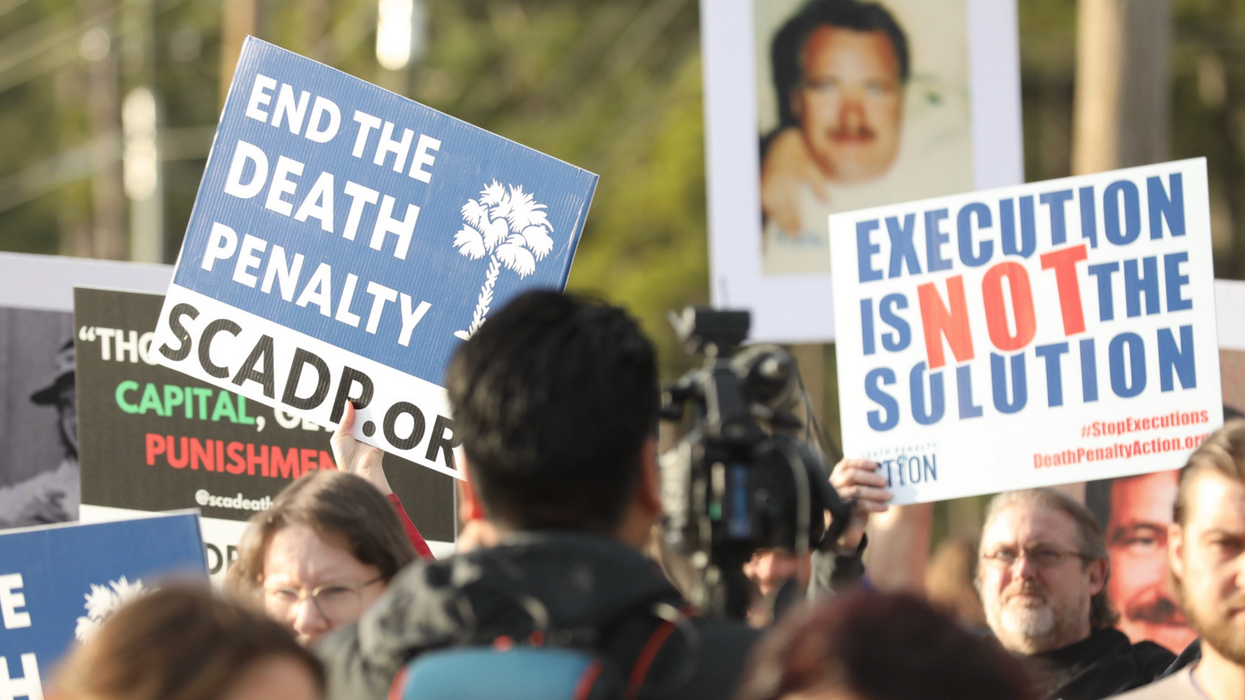Gerald "Bo" King, an attorney representing Sigmon, read his client's final statement shortly before his execution.
"I want my closing statement to be one of love and a calling to my fellow Christians to help us end the death penalty," Sigmon wrote. "An eye for an eye was used as justification to the jury for seeking the death penalty."
"At that time, I was too ignorant to know how wrong that was," he added. "Why? Because we no longer live under the Old Testament law but now live under the New Testament. Nowhere does God in the New Testament give man the authority to kill another man."
A hood was then placed over Sigmon's head and a bullseye over his heart. The three volunteers then fired their rifles from an opening in a wall 15 feet (4.5 meters) away.
"There was no warning or countdown,"
wrote witness and journalist Jeffrey Collins. "The abrupt crack of the rifles startled me. And the white target with the red bullseye that had been on his chest, standing out against his black prison jumpsuit, disappeared instantly as Sigmon's whole body flinched... A jagged red spot about the size of a small fist appeared where Sigmon was shot."
"I've now watched through glass and bars as 11 men were put to death at a South Carolina prison," Collins noted. "None of the previous 10 prepared me for watching the firing squad death of Brad Sigmon on Friday night."
King, who also witnessed Sigmon's killing,
described the execution as "horrifying and violent."
"He chose the firing squad knowing that three bullets would shatter his bones and destroy his heart," said King. "But that was the only choice he had, after the state's three executions by lethal injection inflicted prolonged and potentially torturous deaths on men he loved like brothers."
"He chose the firing squad knowing that three bullets would shatter his bones and destroy his heart."
A desire to resume executions during a 10-year pause due to a shortage of lethal injection drugs prompted Republican state lawmakers to pass and GOP South Carolina Gov. Henry McMaster in 2021 to
sign legislation forcing the state's death row inmates to choose between the electric chair, firing squad, or lethal injection (if available) as their method of execution.
King said state officials failed to provide information about lethal injection drugs.
"Brad only wanted assurances that these drugs were not expired, or diluted, or spoiled—what any of us would want to know about the medication we take, or the food we eat, much less the means of our death," the attorney explained.
Sigmon's legal team had unsuccessfully argued that brain damage and mental illness should have spared him from execution.
Rev. Hillary Taylor, executive director of the advocacy group South Carolinians for Alternatives to the Death Penalty (SCADP), said in a
statement Friday that "by executing Brad Sigmon, South Carolina has also executed the possibility of redemption."
"As Brad's spiritual advisor, I can personally attest to the fact that he is a different man today than the person he was more than 20 years ago, when he harmed the Larke family," she continued. "Our state is declaring that no matter what you do to make up for your wrongdoing, we reserve the right to kill you."
"But the question is not whether Brad deserved to die: The question is whether we deserved to kill," Taylor asserted. "In John 8, Jesus had very pointed instructions about which people can kill other people: 'Only those without sin can cast the first stone."
"The last time I checked, no person on this Earth fits that description, not even Gov. Henry McMaster, whose hardened heart remains the reason why executions continue in the first place," she added.
South Carolina has been executing condemned inmates at a rate described by ACLU of South Carolina communications director Paul Bowers as an "assembly line." The state has put four people to death since last September: Freddie Eugene Owens, killed by lethal injection last September 20; Richard Bernard Moore, killed by lethal injection (after changing his choice from firing squad) last November 1; Marion Bowman Jr., killed by lethal injection on January 31; and Sigmon.
State records show 28 inmates on South Carolina's death row.
Across the United States, there are five more executions scheduled this month, according to the Death Penalty Information Center.
Addressing the issue of capital punishment in South Carolina, SCADP's Taylor said Friday that "despite national and international media news coverage, most South Carolinians will go to bed tonight unaware that we have executed another person—let alone with a firing squad."
"That's how little this issue impacts our citizens," she continued. "South Carolina should be known by other states and countries for its radical care of its citizens. Instead, we are known for our state-sponsored violence."
"If executions made us safer, we would be the 9th-safest state in the country," Taylor argued. "But they don't, and we aren't. It is not the state leaders who will reap the consequences of the death penalty: it is the everyday South Carolina citizens themselves. As long as we have the death penalty, we will fail to address the true causes of violence, including poverty, abuse, and neglect."
Yet instead of curtailing executions, many South Carolina Republicans want to expand the category of crimes that qualify for capital punishment. In 2023, more than 20 Republican state lawmakers backed a bill to make people who obtain abortion care eligible for execution.




